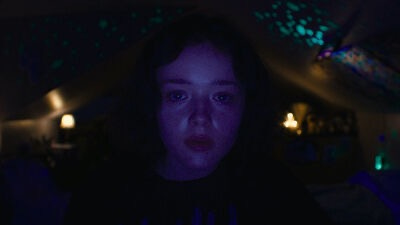After it ended, at first I didn't like We're All Going to the World's Fair. I was trying to pin down what was wrong with it in my mind, and after some introspection, I realized that it was because the film depicts an experience that felt so personal to me that it was almost a betrayal to see it depicted on-screen, too intimate for a general audience.
Jane Schoenbrun's film is magnificent, masterful, an extremely particular work in which every detail imparts the intention behind it. This is one of the most powerful depictions of the internet we've as of yet had on film, and does so in a way which bleeds authenticity while still attacking its themes and characters broadly enough that the movie is elevated by its utilization of its internet aesthetics, rather than in spite of them (as most films about the internet fall to). The too-often expressed maximalism of internet form is inverted in Schoenbrun’s carefully introspective style.
Now, I don't know how this film will work for everyone. I loved it as much as I was jealous of its existence, as I felt such a kinship for the story and lead character that it was effortless to be immersed in the central conceit. It took me back to when I was an isolated teenager, alone for a summer with nothing to occupy my time but /x/ and getting lost in an ARG, finding myself in that liminal space between *playing along* and maybe just wanting to believe it could be real. There is a moment in the third act that reminded me of the moment when the person behind one particular ARG decided to have their peeking behind the curtain at the wizard of oz-moment and revealed the tulpa set-up we had all been LARPing along with to be marketing for a short film, and I was so pissed off because here I was, playing along with the experience, even pretending the creature got me for the sake of the spookiness, and now that was all lost (as was that singular, exciting, terrifying liminal feeling). I remember one night, sitting out smoking until the sun came up, wondering if the shitposting I was doing was real. Was this tulpa from /x/ going to actually come for me? And why is it so exciting to play along? These rabbit holes, and lurking /x/ specifically, truly do drive a person to madness. I spent a lot of time alone.
We’re All Going to the World’s Fair speaks to such a particular experience inherent to the internet and its multiverse of subcultures, and I can't say that the movie didn't move me as someone who grew up with all of it (and Schoenbrun was certainly clever in how to approach this subject matter with subtlety based in the psychological realities of internet identity-building, as opposed to the cringeworthy past example of “you have to type I did it for the lulz three times on Omegle”). The ending of the film is perfect, and I can’t wait for a wider release so that I can watch the film again. The stories we tell on the internet never end, even as they rot away and fade from personal memory. I wonder if waters the tulpa from /x/ will ever come get me for real. Is that the reason I’m still afraid of the dark?
I'm sure that there will be a large following for this movie because my experience growing up online is certainly not unique, but damn is this ever the sort of movie that feels made specifically for me. I have an old youtube account filled with videos like the ones Casey was making (and have even more sockpuppet accounts of weird shit my boyfriend and I made to post on /x/ back in the early 2010s), and the degree to which Schoenbrun captured the beauty of the low-fi aesthetic of this kind of video is nothing short of marvellous. The autoplay sequence at the midpoint of the film is a brilliant formal choice, purely exciting filmmaking that exploits our familiarity with the online apparatus to propel cinema forward in new directions. The movie as a whole is so damn impressive, and has me very excited for what Schoenbrun makes next.
I was also very surprised to hear during the Q&A at Fantasia that the Tarot scene was a last minute improvisation not in the original script, mainly because the last card that Casey pulls is Temperance (which A.E White distinguishes as being an androgynous, gender non-binary figure). I love those sorts of unexpected synchronicities, as I thought it was a subtle nod towards the film’s transgender themes before Schoenbrun said it was completely unscripted. Movies are magic, and this one certainly has me under its spell.





Never thought anyone could do one of those movies that takes place entirely on a desktop...in the most icily controlled mode of Haneke. This filmmaker did it!